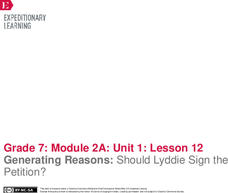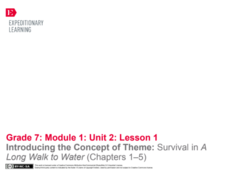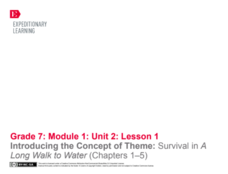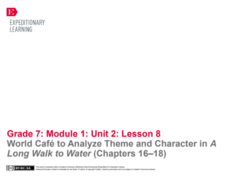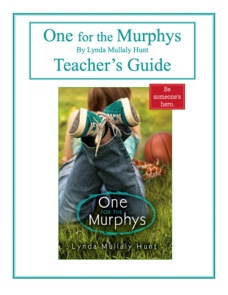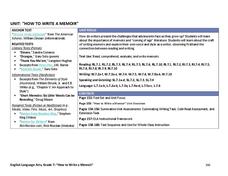EngageNY
Generating Reasons: Should Lyddie Sign the Petition?
Scholars synthesize evidence from Katherine Paterson's Lyddie to create a list of the pros and cons of Lyddie signing a petition about working conditions. They use the Lyddie's Decision anchor chart to record their thoughts and ideas...
EngageNY
Forming Evidence-Based Claims: Should Lyddie Sign the Petition?
Pupils reread selected passages from Katherine Paterson's novel Lyddie. After they finish, individuals gather textual evidence supporting whether Lyddie should sign a controversial petition and record their findings on graphic...
EngageNY
Framing Lyddie’s Decision and Practicing Evidence Based Claims
Scholars grapple with whether the title character of Katherine Paterson's novel, Lyddie, should sign a petition about working conditions at the factory. They engage in close reading and discussion before adding their thinking about the...
EngageNY
Introducing Working Conditions in the Mills
Scholars discover how working in a textile mill in the nineteenth century affected the title character from Katherine Paterson's novel, Lyddie. Partners analyze quotes from the novel and then add evidence and questions about...
EngageNY
Analyzing Character: Who is Lyddie?
Character analysis can help readers feel more connected to a literary text. Scholars explore the topic by writing an acrostic poem about the main character from Katherine Paterson's novel, Lyddie. Then, pupils watch a short video to help...
EngageNY
Modeling Entry Task, Reading Notes, and Reading Strategies for Lyddie
Readers understand a text better when they discuss it with someone else. Scholars continue reading the novel Lyddie by Katherine Paterson, engaging in text-related discussions with five classmates. Next, they add to their chapter three...
EngageNY
Analyzing Word Choice: Understanding Working Conditions in the Mills
Ravenous or hungry, happy or ecstatic—why does word choice matter? Scholars continue to analyze working conditions in the mill and how the conditions affect the protagonist of Katherine Paterson's novel, Lyddie. They engage in a close...
EngageNY
Close Reading to Learn about Lyddie’s Character
Scholars work in pairs to analyze the characters, plot, and setting of Katherine Paterson's novel, Lyddie. Next, they apply what they learned about the characters' feelings and motivation to perform a mini reader's theater.
EngageNY
Introducing Module 2: Working Conditions—Then and Now
Let's get visual! Scholars embark on a gallery walk around the classroom to view quotes, images, and videos about historical and modern working conditions in various professions. They consider how working conditions have changed over...
EngageNY
Introducing the Concept of Theme: Survival in A Long Walk to Water (Chapters 1–5)
Teach the class how to survive! Scholars work together to learn the meaning of theme and determine the message in A Long Walk to Water. After the class discusses possible ideas, they work to identify one central theme for the text....
EngageNY
Analyzing the Central Ideas, Part 2: “The Border”
Writers use the Short Response Graphic Organizer: The Border to learn how to answer short response questions. After completing the organizer, they rotate among classmates conducting peer critiques of their work.
EngageNY
World Café to Analyze Theme and Character in A Long Walk to Water (Chapters 16–18)
Here comes a surprise ending! Readers discuss their thoughts about the ending of A Long Walk to Water by answering probing questions. They participate in a World Café where they work in triads to complete a chart and a prompt during...
Ashoka
A Toolkit for Promoting Empathy in Schools
Instill kindness with a unit all about empathy. Lessons and activities follow a prepare, engage, reflect, and action sequence. Learning experiences include making the classroom a safe environment, peer-invented handshakes, discussions...
Curated OER
Myth and Truth: The First Thanksgiving
Encourage learners to think critically about common myths regarding the Wampanoag Indians in Colonial America. They discover that behind every myth are many possible explanations—and that learning more about American history helps them...
Penguin Books
One for the Murphys by Lynda Mullaly Hunt - Teacher's Guide
Children in foster care face a lot of uncertainty in their lives. A guide for the novel One for the Murphys introduces a main character, Carley, who is thrust into the foster care system. Chapter-by-chapter questions cover key...
Read Write Think
Book Report Alternative: Rewind the Plot!
Have you ever looked for a new way to teach an old concept? Scholars thinking about the rising action of a story in a whole new perspective. However, Book Report Alternative: Rewind the Plot! challenges readers and allows for much...
California Department of Education
Workplace Skills
What skills do employers look for in potential employees? Introduce scholars to the skills that pay the bills during the second of six career and college readiness lesson plans. Once they have defined critical 21st-century skills, groups...
US Institute of Peace
Responding to Conflict: Mediation
What happens when two parties can't come to agreement? Scholars explore the role of a mediator through part 10 of a 15-part series of peacebuilding lessons. Through individual work and role play, pupils brainstorm solutions until they...
US Institute of Peace
Responding to Conflict: Negotiation Role-Play
After a lesson like this one, your class won't hesitate to negotiate! Pupils pair up and negotiate opposing sides of a conflict during the ninth installment in a 15-part series. Once they determine their wants and needs, individuals...
US Institute of Peace
Responding to Conflict: Negotiation—Identifying Wants and Needs
Let's make a deal! Are real negotiations as simple as they are in the game show? Scholars learn the art of negotiation during the 8th instructional activity in a series of 15. The activity kicks off with a fun group negotiation, then...
US Institute of Peace
Responding to Conflict: Active Listening
Did I hear you right? You need a great lesson on active listening? Through large- and small-group activities, learners differentiate between poor and excellent listening skills. The resource, 7th in a series of 15, focuses on active...
Louisiana Department of Education
How to Write a Memoir
Who are we and what shapes our identities? Seventh graders work to answer this question as they learn how to write a memoir. Full of non-print resources and supplemental texts that range from fiction to non-fiction, scholars write their...
ReadWriteThink
Biography Project: Research and Class Presentation
I Have A Dream ... that after the lesson, all individuals master the reading, writing, researching, listening, and speaking skills the biography project helps them develop. Martin Luther King, Jr. serves as a topic example for a model...
Library of Congress
Thomas Jefferson's Library: Making the Case for a National Library
The United States Library of Congress, the largest library in the world. But such was not always the case. The library was destroyed during the War of 1812. In a persuasive letter to Samuel H. Smith, Thomas Jefferson offered to sell his...


